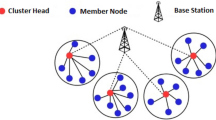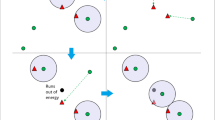Abstract
Energy use is a crucial design concern in wireless ad hoc networks since wireless terminals are typically battery-operated. The design objectives of energy-aware routing are two folds: Selecting energy-efficient paths and minimizing the protocol overhead incurred for acquiring such paths. To achieve these goals simultaneously, we present the design of several on-demand energy-aware routing protocols. The key idea behind our design is to adaptively select the subset of nodes that are required to involve in a route-searching process in order to acquire a high residual-energy path and/or the degree to which nodes are required to participate in the process of searching for a low-power path in networks wherein nodes have transmission power adjusting capability. Analytical and simulation results are given to demonstrate the high performance of the designed protocols in energy-efficient utilization as well as in reducing the protocol overhead incurred in acquiring energy-efficient routes.
Similar content being viewed by others
References
Q. Li, J. Aslam, and D. Rus, Online power-aware routing in wireless ad-hoc networks, in Proc. ACM Mobicom’01 (2001) pp. 97–107.
J.-H. Chang, and L. Tassiulas, Energy conserving routing in wireless ad-hoc networks, in Proc. IEEE INFOCOM’00 (2000) pp. 22–31.
C.E. Perkins, E.M. Royer, and S. Das, Ad hoc on demand distance vector routing, in Proc 2 nd IEEE Workshop on Mobile Computing Systems and Applications (1999) pp. 90–100.
D.B. Johnson, and D.A. Maltz, Dynamic source routing in ad hoc wireless networks, in Mobile Computing,edited by T. Imielinski and H. Korth, chapter 5, Kluwer Academic Publishers (1996) pp. 153–181.
X.-Y. Li, P.-J. Wan, and Y. Wang, Power efficient and sparse spanner for wireless ad hoc networks, in Proc. IEEE ICCCN’01 (2001) pp. 564–567.
N. Li, J. Hou, and, L. Sha, Design and analysis of an MST-based topology control algorithm, in Proc. IEEE INFOCOM’03 (2003).
J. Wu, F. Dai, M. Gao, and I. Stojmenovic, On calculating power-aware connected dominating sets for efficient routing in ad hoc wireless networks, IEEE/KICS Journal of Communication Networks, vol. 4, no. 1 (2002) pp. 59–70.
J. Li, and P. Mohapatra, A novel mechanism for flooding based route discovery in ad hoc networks, in Proc. IEEE GLOBECOM’03 (2003) pp. 692–696.
S. Doshi, S. Bhandare, and T.X. Brown, An on-demand minimum energy routing protocol for a wireless ad hoc network, ACM SIGMOBILE Mobile Computing and Communications Review, vol. 6, no. 3 (2002) pp. 50–66.
M.C. Domingo, D. Remondo, and O. Leon, A simple routing scheme for improving ad hoc network survivability, in Proc. IEEE GLOBECOM’03 (2003) pp. 718–723.
B. Zhang, and H.T. Mouftah, Adaptive energy-aware routing protocols for wireless ad hoc networks, in Proceedings of the First International Conference on Quality of Service in Heterogeneous Wired/Wireless Networks (QShine) (2004) pp. 252–259.
R.K. Ahuja, T.L. Magnanti, and J.B. Orlin, Network Flows: Theory, Algorithms, and Applications, Englewood Cliffs, NJ: Prentice Hall (1993).
Z. Wang and J. Crowcroft, Quality-of-service routing for supporting multimedia applications, IEEE Journal on Selected Areas in Communications, vol. 14, no. 7 (1996) pp. 1228–1234.
V. Rodoplu, and T.H. Meng, Minimum energy mobile wireless networks, IEEE J. Sel. Areas Comm., vol. 17, no. 8 (1999) pp. 1333–1344.
S. Narayanaswamy, V. Kawadia, R.S. Sreenivas, and P.R. Kumar, Power control in ad-hoc networks: Theory, architecture, algorithm and implementation of the COMPOW protocol, in Proc. European Wireless Conference (2002) pp. 156–162.
V. Kawadia, and P.R. Kumar, Power control and clustering in ad hoc networks, in Proc. IEEE INFOCOM’03 (2003) pp. 459–469.
J. Gomez, A.T. Campbell, M. Naghshineh, and C. Bisdikian, PARO: Conserving transmission power in wireless ad hoc networks, in Proc. IEEE ICNP’01 (2001) pp. 24–34.
B. Zhang, and H.T. Mouftah, Localized power-aware routing for wireless ad hoc networks, in Proc. IEEE ICC’04 (2004) pp. 3754–3758.
Y. Xue, and B. Li, A Location-aided power-aware routing protocol in mobile ad hoc networks, in Proc. IEEE Globecom’01 (2001) pp. 2837–2841.
S.-Y. Ni, Y.-C. Tseng, Y.-S. Chen, and J.-P. Sheu, The broadcast storm problem in a mobile ad hoc network, in Proc. ACM MOBICOM’99 (1999) pp. 151–162.
Z.J. Haas, J.Y. Halpern, and L. Li, Gossip-based ad hoc routing, in Proc. IEEE INFOCOM’02 (2002) pp. 1707–1716.
B. Williams, and T. Camp, Comparison of broadcasting techniques for mobile ad hoc networks, in Proc. ACM MOBIHOC’02 (2002) pp. 194–205.
L. Bao, and J.J. Garcia-Luna-Aceves, Topology management in ad hoc networks, in Proc. ACM MOBIHOC’03 (2003) pp. 129–140.
J.E. Wieselthier, G.D. Nguyen, and A. Ephremides, On the construction of energy-efficient broadcast and multicast trees in wireless networks, in Proc. IEEE INFOCOM’00 (2000) pp. 585–594.
J. Cartigny, D. Simplot, and I. Stojmenovic, Localized minimum-energy broadcasting in ad-hoc networks, in Proc. IEEE INFOCOM’03 (2003) pp. 2210–2217.
V. Bharghavan, A.J. Demers, S. Shenker, and L. Zhang, MACAW: A media access protocol for wireless LAN’s, in Proc. ACM SIGCOMM’94 (1994) pp. 212–225.
IEEE Computer Society LAN MAN Standards Committee, Wireless LAN Medium Access Protocol (MAC) and Physical Layer(PHY) Specification, IEEE Std 802.11-1997. The Institute of Electrical and Electronics Engineers (1997).
Author information
Authors and Affiliations
Corresponding author
Additional information
Baoxian Zhang received his B.S., M.S., and Ph.D. degrees in Electrical Engineering from Northern Jiaotong University, Beijing, China in 1994, 1997, and 2000, respectively. From January 2001 to August 2002, he was working with Department of Electrical and Computer Engineering at Queen’s University in Kingston as a postdoctoral fellow. He is currently a research scientist with the School of Information Technology and Engineering (SITE) of University of Ottawa in Ottawa, Ontario, Canada. He has published over 40 refereed technical papers in international journals and conference proceedings. His research interests include routing algorithm and protocol design, QoS management, wireless ad hoc and sensor networks, survivable optical networks, multicast communications, and performance evaluation. He is a member of the IEEE.
Hussein Mouftah joined the School of Information Technology and Engineering (SITE) of the University of Ottawa in September 2002 as a Canada Research Chair (Tier 1) Professor in Optical Networks. He has been with the Department of Electrical and Computer Engineering at Queen’s University (1979-2002), where he was prior to his departure a Full Professor and the Department Associate Head. He has three years of industrial experience mainly at Bell Northern Research of Ottawa, now Nortel Networks (1977-79). He has spent three sabbatical years also at Nortel Networks (1986-87, 1993-94, and 2000-01), always conducting research in the area of broadband packet switching networks, mobile wireless networks and quality of service over the optical Internet. He served as Editor-in-Chief of the IEEE Communications Magazine (1995-97) and IEEE Communications Society Director of Magazines (1998-99) and Chair of the Awards Committee (2002-2003). He is a Distinguished Speaker of the IEEE Communications Society since 2000.
Dr. Mouftah is the author or coauthor of five books, 22 book chapters and more than 700 technical papers and 8 patents in this area. He is the recipient of the 1989 Engineering Medal for Research and Development of the Association of Professional Engineers of Ontario (PEO), and the Ontario Distinguished Researcher Award of the Ontario Innovation Trust. He is the joint holder of the Best Paper Award for a paper presented at SPECTS’2002, and the Outstanding Paper Award for papers presented at the IEEE HPSR’2002 and the IEEE ISMVL’1985. Also he is the joint holder of a Honorable Mention for the Frederick W. Ellersick Price Paper Award for Best Paper in the IEEE Communications Magazine in 1993. He is the recipient of the IEEE Canada (Region 7) Outstanding Service Award (1995). Also he is the recipient of the 2004 IEEE Communications Society Edwin Howard Armstrong Achievement Award, and the 2004 George S. Glinski Award for Excellence in Research of the Faculty of Engineering, University of Ottawa. Dr. Mouftah is a Fellow of the IEEE (1990) and Fellow of the Canadian Academy of Engineering (2003).
Rights and permissions
About this article
Cite this article
Zhang, B., Mouftah, H.T. Energy-aware on-demand routing protocols for wireless ad hoc networks. Wireless Netw 12, 481–494 (2006). https://doi.org/10.1007/s11276-006-6547-9
Published:
Issue Date:
DOI: https://doi.org/10.1007/s11276-006-6547-9




